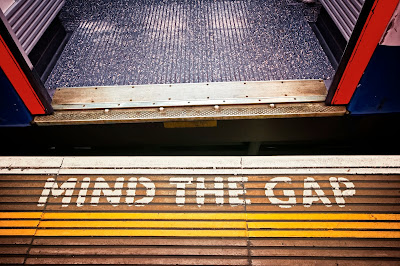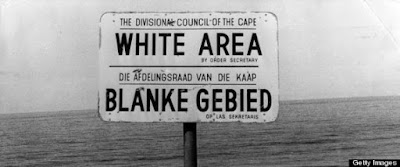Mind the Gap
I’ve never been more aware of the gap – really, a yawning chasm - between some areas of the disability sector as I am now.
Last week, I went to a disability sector event in Sydney. It was accessible – accessible to the point of hilarity, because it was at the Human Rights Commission. Graeme Innes and a bunch of other advocates have redeveloped the lift car system, and consequently the under educated and sighted now fumble blindly for a familiar system that is not there, queuing like Pavlov’s dogs and wondering why the lift is speaking to us.
There were a lot of disabled people there – and apart from a dearth of accessible toilets, everything seemed to go pretty smoothly. We worked together on a national plan against violence, people mostly had insightful and articulate contributions and there was a real sense of community and commonality shared by most of the attendees.
The highlight for me was at the end – where people rejected what had been foisted upon them (a refusal by government to acknowledge and address the issues around abuse in institutions) and determined to change it.
Then I came back to Perth, and attended an old school parent group AGM. And there was the gap.
I think there is always good ‘intent’ in these groups, especially the charity and medical groups. But the power balances were apparent – many ‘important people’ in suits and women coiffed to within an inch of their lives, talking about ways they could do things to and for people. The old medical model has never been so alive – it was even held in an old hospital, not a popular choice for the one wheelchair user who spent a very long time parking and struggling up an almost vertical ramp. And the tension was almost palpable – people clutching to retain the power that they think is theirs.
The gap was that the first event was about people with disability, and that people with disability were actively involved in redressing an imbalance of power, looking at a circumstance and saying ‘No, this will not do. This is not what our lives look like, and we refute what you are trying to inflict on us. We take our power back.’
The second event was about parents of children with disability, but the parents who had built this old organisation were largely absent – too old, too tired or too dead to continue battling. The parents involved were able only to observe or be peripherally involved whilst the power brokers maintained the status quo. The attitude of many of the members is ‘I will smile and be grateful, because you know what is best for me and my family. I will be thankful for whatever power you give me in determining my own life and that of my family members, because I have been helpless for a long time.’ And there was the gap.
It’s truly astonishing how we let these power imbalances occur.
People with disability and their families have this in common – we are the experts in our own lives. That is not what the medical model tells us, and so the issues remain. Issues like daily imbalances of power and situations where power and control cause chaos in our lives.
It’s easier to provide services for people if we hammer square pegs into round holes and insist that they all fit. No matter what damage occurs to the person who is being hammered.
It’s easier if people are powerless and devalued and less than other people, because then we are less trouble. Grateful, and silent. In the disability sector, the squeaky wheel doesn’t get the grease. The squeaky wheel continues to squeak until both wheels fall off.
And it is easier if we believe the old myths about disability, the ones perpetuated by doctors and ‘professionals’ – those myths that tell us that disability is bad, a personal problem, that we need to be cured or appear less disabled, that it is disaster or deficit, not difference.
We spend our time looking at our feet and engaging in relentless, bitter, petty tribal conflicts – because we can’t battle our way out of crisis. We can’t work together to take back control.
Bollocks to that. Let’s take our power back. And let’s bridge the blasted gap so that we can work together.
(Cartoon description) A man is interviewing a contestant in a ‘Quiz Wiz’ box.
Who are the most important and interesting people in the world?
Politicians are…of course.
Correct. And how much media content should be devoted to them?
Huge amounts. Too much is never enough.
Correct answer. What is the most fruitful, worthy and wonderful principle in the democratic political culture?
That would be the idea of relentless bitter tribal conflict.
Sorry, that answer is incomplete. It should be relentless bitter PETTY tribal conflict.
Oh no! How dumb of me! Pettiness is the most IMPORTANT THING OF ALL…





Yep!
ReplyDeleteLooking forward to Saturday post.
ReplyDeleteKeep it up!
Sly